Related Research Articles
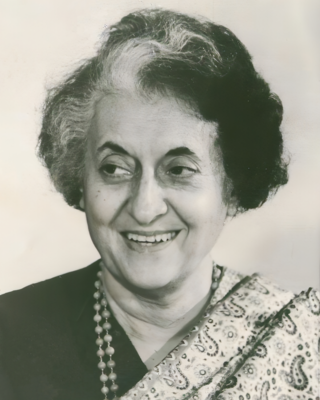
Indira Gandhi was an Indian politician who served as the third Prime Minister of India from 1966 to 1977 and again from 1980 until her assassination in 1984. She was India's first and, to date, only female prime minister, and a central figure in Indian politics as the leader of the Indian National Congress. Gandhi was the daughter of Jawaharlal Nehru, the first prime minister of India, and the mother of Rajiv Gandhi, who succeeded her in office as the country's sixth prime minister. Furthermore, Gandhi's cumulative tenure of 15 years and 350 days makes her the second-longest-serving Indian prime minister after her father. Henry Kissinger described her as an "Iron Lady", a nickname that became associated with her tough personality since her lifetime.

Jawaharlal Nehru was an Indian anti-colonial nationalist, statesman, secular humanist, social democrat, and author who was a central figure in India during the middle of the 20th century. Nehru was a principal leader of the Indian nationalist movement in the 1930s and 1940s. Upon India's independence in 1947, he served as the country's first prime minister for 16 years. Nehru promoted parliamentary democracy, secularism, and science and technology during the 1950s, powerfully influencing India's arc as a modern nation. In international affairs, he steered India clear of the two blocs of the Cold War. A well-regarded author, his books written in prison, such as Letters from a Father to His Daughter (1929), An Autobiography (1936) and The Discovery of India (1946), have been read around the world.

Mohandas Karamchand Gandhi was an Indian lawyer, anti-colonial nationalist and political ethicist who employed nonviolent resistance to lead the successful campaign for India's independence from British rule. He inspired movements for civil rights and freedom across the world. The honorific Mahātmā, first applied to him in South Africa in 1914, is now used throughout the world.

Rajiv Gandhi was an Indian politician who served as the 6th Prime Minister of India from 1984 to 1989. He took office after the assassination of his mother, then–prime minister Indira Gandhi, to become at the age of 40 the youngest Indian prime minister. He served until his defeat at the 1989 election, and then became Leader of the Opposition, Lok Sabha, resigning in December 1990, six months before his own assassination.
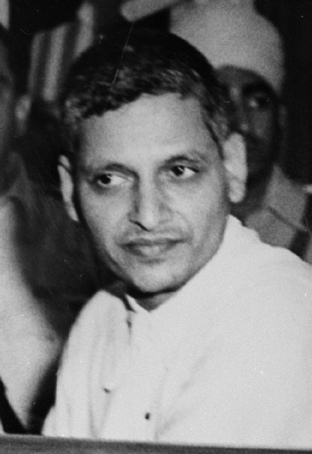
Nathuram Vinayak Godse was a Hindu nationalist who on 30 January 1948 assassinated Mahatma Gandhi. Godse was a member of the political party, the Hindu Mahasabha; and a member of the Rashtriya Swayamsevak Sangh (RSS), a right-wing Hindu paramilitary volunteer organisation; and a populariser of the work of his mentor Vinayak Damodar Savarkar, who had created the ideology of Hindutva.

The Indian National Congress (INC), colloquially the Congress Party or simply the Congress, is a political party in India with deep roots in most regions of India. Founded on 28 December 1885, it was the first modern nationalist movement to emerge in the British Empire in Asia and Africa. From the late 19th century, and especially after 1920, under the leadership of Mahatma Gandhi, the Congress became the principal leader of the Indian independence movement. The Congress led India to independence from the United Kingdom, and significantly influenced other anti-colonial nationalist movements in the British Empire.

Subhas Chandra Bose was an Indian nationalist whose defiance of British authority in India made him a hero among many Indians, but his wartime alliances with Nazi Germany and Imperial Japan left a legacy vexed by authoritarianism, anti-Semitism, and military failure. The honorific 'Netaji' was first applied to Bose in Germany in early 1942—by the Indian soldiers of the Indische Legion and by the German and Indian officials in the Special Bureau for India in Berlin. It is now used throughout India.

Vinayak Damodar Savarkar, Marathi pronunciation: [ʋinaːjək saːʋəɾkəɾ]; 28 May 1883 – 26 February 1966) was an Indian politician, activist and writer. Savarkar developed the Hindu nationalist political ideology of Hindutva while confined at Ratnagiri in 1922. He was a leading figure in the Hindu Mahasabha. The prefix "Veer" has been applied to his name by his followers.
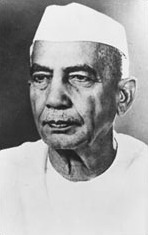
Chaudhary Charan Singh was an Indian politician and a freedom fighter who served as the 5th Prime Minister of India from 1979 to 1980 and the 3rd Deputy Prime Minister of India from January 1979 to July 1979. He served as 5th Chief Minister of Uttar Pradesh as a member of Bhartiya Kranti Dal. Charan Singh is known for his land and agricultural reform initiatives. He is widely regarded as the "Champion of farmers" after his life has been dedicated to advocating for the wellbeing and rights of farmers. He is the first leader outside the Indian National Congress who formed government in the northern India and became 5th chief minister of Uttar Pradesh.

The Kingdom of God Is Within You is a non-fiction book written by Leo Tolstoy. A Christian anarchist philosophical treatise, the book was first published in Germany in 1894 after being banned in his home country of Russia. It is the culmination of 30 years of Tolstoy's thinking and lays out a new organization for society based on an interpretation of Christianity focusing on universal love.

Sanjay Gandhi was an Indian politician and the younger son of Indira Gandhi and Feroze Gandhi. He was a member of parliament, Lok Sabha and the Nehru–Gandhi family.
Nonresistance is "the practice or principle of not resisting authority, even when it is unjustly exercised". At its core is discouragement of, even opposition to, physical resistance to an enemy. It is considered as a form of principled nonviolence or pacifism which rejects all physical violence, whether exercised on individual, group, state or international levels. Practitioners of nonresistance may refuse to retaliate against an opponent or offer any form of self-defense. Nonresistance is often associated with particular religious groups, such as Anabaptist Christianity.

The Story of My Experiments with Truth is the autobiography of Mahatma Gandhi, covering his life from early childhood through to 1921. It was written in weekly installments and published in his journal Navjivan from 1925 to 1929. Its English translation also appeared in installments in his other journal Young India. It was initiated at the insistence of Swami Anand and other close co-workers of Gandhi, who encouraged him to explain the background of his public campaigns. In 1998, the book was designated as one of the "100 Best Spiritual Books of the 20th Century" by a committee of global spiritual and religious authorities.

Gandhism is a body of ideas that describes the inspiration, vision, and the life work of Mohandas K. Gandhi. It is particularly associated with his contributions to the idea of nonviolent resistance, sometimes also called civil resistance.
Virachand Raghavji Gandhi was a Jain scholar who represented Jainism at the first World Parliament of Religions in 1893. A barrister by profession, he worked to defend the rights of Jains, and wrote and lectured extensively on Jainism, other religions, and philosophy.
"They Killed Him" is a song written by Kris Kristofferson for his October 1986 album Repossessed.
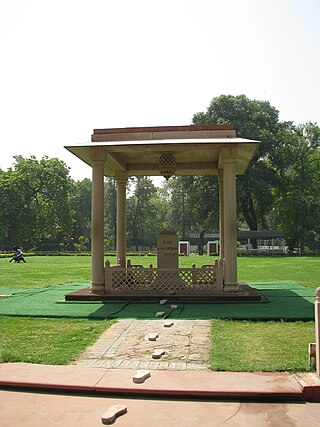
Mohandas Karamchand Gandhi was assassinated on 30 January 1948 at age 78 in the compound of Birla House, a large mansion in central New Delhi. His assassin was Nathuram Godse, from Pune, Maharashtra, a Hindutva activist, a member of the Rashtriya Swayamsevak Sangh (RSS), a right-wing Hindu paramilitary organization as well as a member of the Hindu Mahasabha.

J. C. Kumarappa was an Indian economist and a close associate of Mahatma Gandhi. A pioneer of rural economic development theories, Kumarappa is credited for developing economic theories based on Gandhism – a school of economic thought he coined "Gandhian economics."
Seven Social Sins is a list by Frederick Lewis Donaldson that Mohandas Karamchand Gandhi published in his weekly newspaper Young India on October 22, 1925. Later he gave this same list to his grandson, Arun Gandhi, written on a piece of paper on their final day together shortly before his assassination. The Seven Sins are:
- Wealth without work.
- Pleasure without conscience.
- Knowledge without character.
- Commerce without morality.
- Science without humanity.
- Religion without sacrifice.
- Politics without principle.
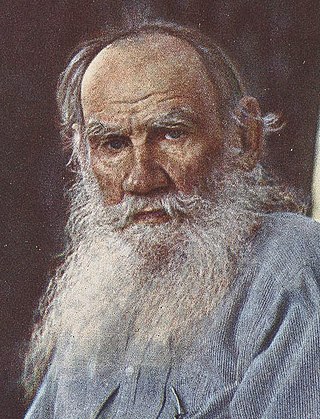
Count Lev Nikolayevich Tolstoy, usually referred to in English as Leo Tolstoy, was a Russian writer. He is regarded as one of the greatest and most influential authors of all time. He received nominations for the Nobel Prize in Literature every year from 1902 to 1906 and for the Nobel Peace Prize in 1901, 1902, and 1909.
References
- ↑ Gandhi, Rajmohan (2008). Gandhi: The Man, His People, and the Empire. University of California Press. pp. 65–66. ISBN 978-0520255708.
- ↑ Cortright, David (2009). Gandhi and Beyond: Nonviolence for a New Political Age. Routledge. ISBN 978-1594517693.